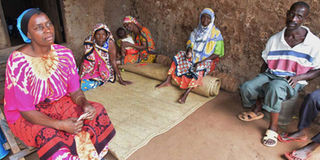Breaking News: At least 10 feared to have drowned in Makueni river
Woman died at clinic for lack of assistance

Family and friends gather at the home of Ms Mwanaasha Omar (left) on May 9, 2018 to condole with her after she lost her 30-year-old daughter, Subira Hamisi, on May 3, 2018 to a birth complication. PHOTO | WACHIRA MWANGI | NATION MEDIA GROUP
What you need to know:
Ms Omar said after her daughter died, she pleaded with the watchman to let them keep the body inside the facility fearing it might be rained on.
A few hours later (around 7pm) the county ambulance with two medics rushed to the village to collect the body.
The 2014 Kenya Demographic and Health Survey estimates that 5,000 to 6,000 women die in childbirth every year while 22 out of 1,000 babies die at birth.
Subira Hamisi was excited as she looked forward to welcoming her second child into the world.
However, things went awry on May 2, 2018 when she was awoken by continuous labour pains as she slept at home in Gombato in Ukunda, Kilifi county.
As the pains gradually subsided, she decided to wait until the following day to seek medical advice, since it happened to be her scheduled antenatal visit.
Luckily for Mrs Hamisi, 30, the nearest health facility, Gombato Dispensary, where attended antenatal clinic, was about 200 metres away.
TIRED
“My daughter was due any moment. In fact, she thought that waiting to see the doctor on her clinic day would prompt the health workers to admit her because of the pains. But when she went there, I was surprised that they did not admit or induce her,” said Mrs Hamisi’s mother, Mwanaasha Omar.
Worried, Mrs Omar decided to keep an eye on her daughter. She said her daughter looked very tired, although she insisted that she was fine.
But a few hours after Mrs Hamisi visited the clinic, the labour pains came back stronger and she asked her mother to rush her to the dispensary.
WATCHMAN
“She told me to prepare myself to receive my grandchild that day. She was crying and writhing in pain. We rushed her back to the dispensary on a boda boda at around 4.30pm,” recalled Mrs Omar.
But they found the gate locked, and the watchman refused to open it, saying there was no health workers to attend to her daughter, Mrs Omar recalls.
Meanwhile, Mrs Hamisi had alighted from the boda boda and was on her knees, praying and and convulsing. Mrs Omar says she pleaded with the watchman to least allow her daughter lie on a bed at the facility but he refused.
She then begged him to call a health worker to come and help but he ignored her.
HELPLESS
Just as it started drizzling, Mrs Hamisi breathed her last after her waters broke.
“The watchman told us to go to another facility. I cried for help and a traditional birth attendant came but it was too late. My daughter’s waters broke, she lost consciousness and died as we watched. I was helpless, numb, angry and sad,” she said.
Ms Omar said after her daughter died, she pleaded with the watchman to let them keep the body inside the facility fearing it might be rained on.
AMBULANCE
“He refused and left, so relatives decided to take the body home,” Mrs Omar added.
A few hours later (around 7pm) the county ambulance with two medics rushed to the village to collect the body.
“I was confused. I thought I was dreaming. Where was this ambulance when my daughter needed it? Where were the health workers? Is a dead body more important than a person who is alive? It was cruel,” Ms Omar said, her voice quivering with emotion before she broke down.
SURVEY
The 2014 Kenya Demographic and Health Survey estimates that 5,000 to 6,000 women die in childbirth every year while 22 out of 1,000 babies die at birth.
The government targets reducing maternal deaths to fewer than 70 per 100,000 and under-five deaths to 12 and 25 per cent 1,000 live births respectively.
A consultant gynaecologist at the Pandya Memorial Hospital in Mombasa said the woman might have developed spontaneous complications, adding that many women do not understand their bodies and how such complications occur.
According to the 2017 Kenya Medical Practitioners, Pharmacists and Dentists Union, Kwale had a shortage of 587 doctors against the World Health Organisation standards. The report indicated that the county had 65 doctors.





